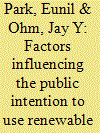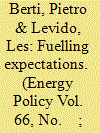|
|
|
Sort Order |
|
|
|
Items / Page
|
|
|
|
|
|
|
| Srl | Item |
| 1 |
ID:
127201


|
|
|
|
|
| Publication |
2014.
|
| Summary/Abstract |
India is poised to spend over USD 5.8 billion as part of the National Smart Grid Mission aimed to alleviate India's ailing power sector as part of its 12th Five year plan (2012-2017). The federal government sponsored Restructured Accelerated Power Development and Reforms Program (R-APDRP) is also focused on building ICT capability in the state electricity boards. Presently however, there is no power sector specific cyber security mandates or policies in India. The Stuxnet, Shamoon and Anonymous incidents have shown that cyber attacks can cause significant damage and pose a risk to National Critical Infrastructure. A lack of security planning as part of designing the Smart grids can potentially leave gaping holes in the country's power sector stability. The paper highlights key cyber security threats across the entire power sector value chain-from generation, to transmission and distribution. It is aimed at building the case for power sector specific cyber security regulations based on the experience of regulators in other critical infrastructure sectors like Banking and Telecom in India and power sector regulations internationally.
|
|
|
|
|
|
|
|
|
|
|
|
|
|
|
|
| 2 |
ID:
127233


|
|
|
|
|
| Publication |
2014.
|
| Summary/Abstract |
Through a qualitative comparative case study, this investigation examined the process by which three school districts in Wisconsin, U.S.A., developed a school energy policy and complementary energy education plan. To guide the process, the researchers created an outline of recommended steps for the districts to follow. Although there were variations in the sequence and perceived ease of the steps, the Energy Task Force members involved in the process found the outline to be a supportive guide. Further analysis of the cases involved interviewing members of the Energy Task Forces to identify facilitating and obstructing factors. The study concluded that factors such as level of environmental literacy, along with aspects of the school culture and leadership, interacted to influence the successful drafting of school energy policies and education plans. In addition to introducing an outline of recommended steps that can be used by other school policy development teams interested in promoting energy efficiency, this study adds insights into the analysis of energy policy work within the context of a school setting.
|
|
|
|
|
|
|
|
|
|
|
|
|
|
|
|
| 3 |
ID:
127203


|
|
|
|
|
| Publication |
2014.
|
| Summary/Abstract |
The increases in a country's energy capacity are related to its gross domestic product (GDP). In Brazil, increases in income and the consumption of goods and services have led to an increase in the generation of solid waste (SW), which is sent to landfills as a method of treatment and final disposal. The purpose of this study was to facilitate an increase in energy generation from renewable resources, specifically from landfills via thermal biogas plants, and the research was divided into two phases. The first phase involved the assessment of the potential population size contributing to the landfill, which could result in the installation of a financially viable enterprise to generate electricity in Brazil. Next, an estimate of the costs associated with the generation and collection of solid waste in Brazil was predicted by GDP prognoses, the latter being in accordance with the National Energy Balance (Balanço Energético Nacional - BEN) plan created by the Mines and Energy Ministry of Brazil (Ministério de Minas e Energia do Brasil - MME). The net present value (NPV) and internal rate of return (IRR) of each enterprise scenario was used in the first stage to assess the plan's financial viability. In the second stage, estimation curves such as logistics, decreasing rate of growth, and logarithmic curves were used to establish relationships between the generation scenarios and the projected collection of SW and projected GDP. Thus, a range of possible landfill biogas/methane generation values and installed energy capacities were created, considering the extreme maximum and minimum values. These values were related to the energy sources from residual fuels reported by BEN. The results demonstrated that such values still represented a small percentage (0.00020% in 2010 and 0.44496-0.81042% in 2030) of the projected energy generation from residual fuels. Thus, an urgent need was identified to formulate policies that would encourage landfills as a source of renewable energy, broadening the number of financially viable initiatives for energy generation from landfill biogas for populations of fewer than 200,000 inhabitants.
|
|
|
|
|
|
|
|
|
|
|
|
|
|
|
|
| 4 |
ID:
127206


|
|
|
|
|
| Publication |
2014.
|
| Summary/Abstract |
Emergent business models seek to take advantage of new market mechanisms driven by technological changes, particularly those related to the production and delivery of clean or sustainable energy. Such business models often function at the intersection of various industries, with global views, and the resulting systems have distinct social, political, environmental, economic, technological, and business dimensions. Such holistic systems are not only difficult to develop but also require support from a broad range of actors with effective regulations and policies in place, such that the firm functions within a framework that integrates various factors. This study substantiates such a framework by detailing the nascent algae-based bio-fuel industry that caters to the aviation sector while arguing that businesses in the energy industry can emerge as a next-practice platform that drive a sixth wave of innovation. The framework begins with three basic enablers, innovation, flexibility, and sustainability, and explains how value from renewable energy technologies can be created and captured sustainably and innovatively with new market mechanisms implemented by firms with green business models.
|
|
|
|
|
|
|
|
|
|
|
|
|
|
|
|
| 5 |
ID:
127208


|
|
|
|
|
| Publication |
2014.
|
| Summary/Abstract |
The Fukushima accident has influenced public attitudes toward energy sources and technologies, including not only nuclear energy, but also other energy sources. Therefore, it is worth investigating how the accident influenced public perceptions of renewable energy and its technologies, between the time before the accident and after the accident. This study aims to explore the effects of the Fukushima accident on the public perceptions of renewable energy technologies in South Korea, the closest nation to Japan. This study found that there were notable differences of public perceptions, including public attitudes, perceived benefits, trust, intention to use, knowledge and risks between before and after the earthquake. In addition, the perceived cost of renewable energy technologies was the primary determinant of the intention to use the technologies before the accident, whereas public attitudes toward the technologies became the main antecedents of the intention after the accident. After the accident, we found that there is a multi-dimensional matrix of perceived trust-benefits (with risks)-attitude-intention to use, in explaining the public acceptance of renewable energy technologies. Moreover, we found significant roles of the perceived trust, benefits and risks in the research model. Based on the empirical findings, both implications and suggestions are presented.
|
|
|
|
|
|
|
|
|
|
|
|
|
|
|
|
| 6 |
ID:
127883


|
|
|
|
|
| Publication |
2014.
|
| Summary/Abstract |
Controversy over EU-wide biofuel policy resonated within the UK, fuelling policy disagreements among UK public authorities. They disagreed over how to protect a space for future second-generation biofuels, which were expected to overcome harm from first-generation biofuels. The UK government defended rising targets for available biofuels as a necessary stimulus for industry to help fulfil the UK's EU obligations and eventually develop second-generation biofuels. By contrast, Parliamentary Select Committees opposed biofuel targets on grounds that these would instead lock-in first-generation biofuels, thus delaying or pre-empting second-generation biofuels. Those disagreements can be explained by different institutional responsibilities and reputational stakes towards 'promise-requirement cycles', whereby techno-optimistic promises generate future requirements for the actors involved. The UK government's stance illustrates a 'policy-promise lock-in', a dilemma whereby promised support is a requirement for credibility towards technology innovators and thus technoscientific development - but may delay the redirection of support from incumbent to preferable emerging technologies. Thus the sociology of expectations - previously applied to technological expectations from technology innovators - can be extended to analyse public authorities.
|
|
|
|
|
|
|
|
|
|
|
|
|
|
|
|
| 7 |
ID:
127196


|
|
|
|
|
| Publication |
2014.
|
| Summary/Abstract |
Exploitation of unconventional gas is limited by a number of economic, legal, environmental and social factors. When it comes to Poland, legal and environmental factors are of special importance, as they might significantly impact the exploitation of both tight gas and shale gas.
Exploitation of unconventional gas deposits, because of the technology needed for opening of these deposits, has relatively great impact on the balance sheet and the quality of water. Polish water resources are limited and depend on time and local circumstances. Therefore, obtaining adequate amounts of water needed to hydraulic fracturing of unconventional gas reservoirs may cause some problems. Another problem is return water management. Injection of contaminated water into the rockmass on a large scale seems to be impossible in Poland. Water discharge to surface waters, which seems to be the most probable solution, would result in deterioration of the purity of Polish rivers.
Around 32% of Poland is covered by different forms of protection, which might include limitations in exploitation of hydrocarbon deposits (depending on the type of area).
Exploration, documentation and exploitation of unconventional gas in Poland is regulated mainly by the laws and regulations regulating geological and mining activities, environmental protection and waste management.
|
|
|
|
|
|
|
|
|
|
|
|
|
|
|
|
| 8 |
ID:
188299


|
|
|
|
|
| Summary/Abstract |
This essay analyses the evolving character of Russia’s energy relationships in the post-Soviet space by looking at the Caucasus and Central Asia. In the past, due to the historic legacy of Russia-controlled pipelines, Moscow was able to exert influence by manipulating structural asymmetries in regional natural gas value chains. This has changed with China’s entry as the region’s major market alternative and the breakthroughs of the global energy transition. The initial phase of Russia’s declining ‘energy power’ vis-à-vis China in Central Asia came to an end as the Crimea crisis was unfolding, an event that has drastically changed the risk perception of Russian gas in Europe, setting off a chain of consequences that led to a re-evaluation of Russia’s energy power in post-Soviet Eurasia. The essay also shows, however, that Russia maintains influence in post-Soviet Eurasia through inter-elite networks and shared concerns among hydrocarbon-exporting countries about the energy transition.
|
|
|
|
|
|
|
|
|
|
|
|
|
|
|
|
|
|
|
|
|